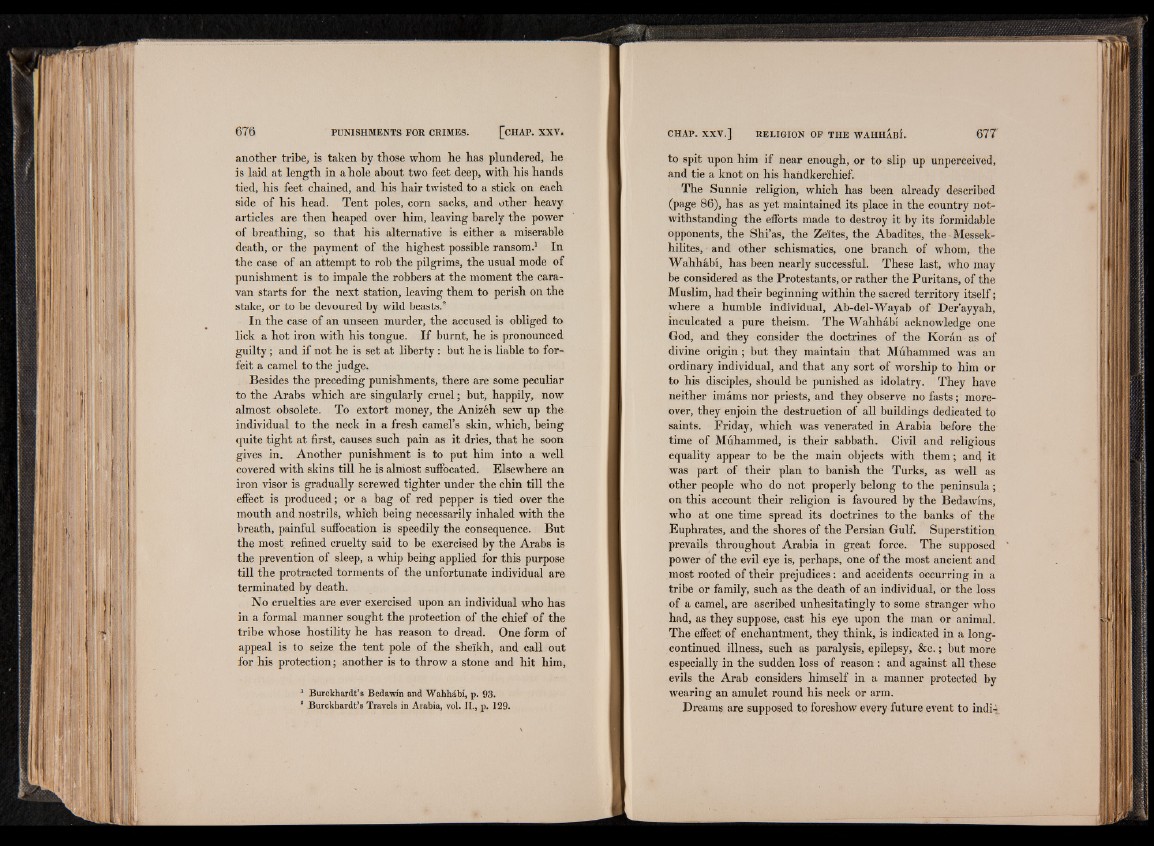
another tribe, is taken by those whom he has plundered, he
is laid at length in a hole about two feet deep, with his hands
tied, his feet chained, and his hair twisted to a stick on each
side of his head. Tent poles, corn sacks, and other heavy
articles are then heaped over him, leaving barely the power
of breathing, so that his alternative is either a miserable
death, or the payment of the highest possible ransom.1 In
the case of an attempt to rob the pilgrims, the usual mode of
punishment is to impale the robbers at the moment the caravan
starts for the next station, leaving them to perish on the
stake, or to be devoured by wild beasts.2
In the case of an unseen murder, the accused is obliged to
lick a hot iron with his tongue. If burnt, he is pronounced
guilty; and if not he is set at liberty: but he is liable to forfeit
a camel to the judge.
Besides the preceding punishments, there are some peculiar
to the Arabs which are singularly cruel; but, happily, now
almost obsolete. To extort money, the Anizeh sew up the
individual to the neck in a fresh camel’s skin, which, being
quite tight at first, causes such pain as it dries, that he soon
gives in. Another punishment is to put him into a well
covered with skins till he is almost suffocated. Elsewhere an
iron visor is gradually screwed tighter under the chin till the
effect is produced; or a bag of red pepper is tied over the
mouth and nostrils, which being necessarily inhaled with the
breath, painful suffocation is speedily the consequence. But
the most refined cruelty said to be exercised by the Arabs is
the prevention of sleep, a whip beilig applied for this purpose
till the protracted torments of the unfortunate individual are
terminated by death.
No cruelties are ever exercised upon an individual who has
in a formal manner sought the protection of the chief of the
tribe whose hostility he has reason to dread. One form of
appeal is to seize the tent pole of the sheikh, and call out
for his protection; another is to throw a stone and hit him,
1 Burckhardt’s Bedawin and Wahhdbi, p. 93.
1 Burckhardt’s Travels in Arabia, vol. II., p. 129.
to spit upon him if near enough, or to slip up unperceived,
and tie a knot on his handkerchief.
The Sunnie religion, which has been already described
(page 86), has as yet maintained its place in the country notwithstanding
the efforts made to destroy it by its formidable
opponents, the Shi’as, the Zeites, the Abadites, the-Messek-
hilites, and other schismatics, one branch of whom, the
Wahhabi, has been nearly successful. These last, who may
be considered as the Protestants, or rather the Puritans, of the
Muslim, had their beginning within the sacred territory itself;
where a humble individual, Ab-del-Wayab of Der’ayyah,
inculcated a pure theism. The Wahhabi acknowledge one
God, and they consider the doctrines of the Koran as of
divine origin; but they maintain that Muhalnmed was an
ordinary individual, and that any sort of worship to him or
to his disciples, should be punished as idolatry. They have
neither imams nor priests, and they observe no fasts; moreover,
they enjoin the destruction of all buildings dedicated to
saints. Friday, which was venerated in Arabia before the
time of Muhammed, is their sabbath. Civil and religious
equality appear to be the main objects with them; ancf it
was part of their plan to banish the Turks, as well as
other people who do not properly belong to the peninsula;
on this account their religion is favoured by the Bedawins,
who at one time spread its doctrines to the banks of the
Euphrates, and the shores of the Persian Gulf. Superstition
prevails throughout Arabia in great force. The supposed
power of the evil eye is, perhaps, one of the most ancient and
most rooted of their prejudices: and accidents occurring in a
tribe or family, such as the death of an individual, or the loss
of a camel, are ascribed unhesitatingly to some stranger who
had, as they suppose, cast his eye upon the man or animal.
The effect of enchantment, they think, is indicated in a long-
continued illness, such as paralysis, epilepsy, &c.; but more
especially in the sudden loss of reason : and against all these
evils the Arab considers himself in a manner protected hy
wearing an amulet round his neck or arm.
Dreams are supposed to foreshow every future event to indi4